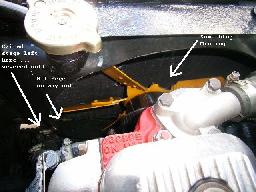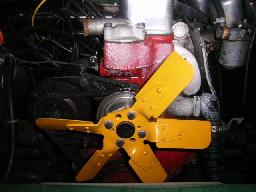The MGA With An Attitude
FAN BLADE BENT OR OUT OF BALANCE - CO-104
CO-104 is a blatantly forward discussion about defective fan blades.
At 01:02 PM 6/29/02 -0400, Gordie Bird wrote:
>"Are fans balanced?"
It is my experience with MGA fans, both real world and professional (mechanical engineer), that the original fans are inherently well balanced when they leave (left) the factory. The fan hub is stamped on precision machined production dies and is quite precise and symmetrical from one blade mount to the next. The blades are stamped on precision machined production dies and are virtually and functionally identical and of equal weight. The fan is assembled with rivets that are interference fit in the holes when completed, so there is no discernible misalignment from one blade to the next. You would need a setup jig and precision instruments to measure the variation in blade length. New replacement parts may have a different story.
>"I have a new fan where three of the blades are 1/8" longer than the other 3."
New? As a matter of public safety I would like to ask where this part was obtained?
The logical conclusion is that if your fan has a variation of 1/8" in the length of the blades it is either bad manufacture or it has been somehow deformed (bent in various ways) since leaving the factory. This will likely cause it to be out of balance. Exactly how much out of balance is not possible to say without dynamic measurement. However, positioning one blade 1/8" farther from the center of rotation that other blades is likely to cause a vibration (maybe even a noticeable vibration), and over time this vibration can be detrimental to the water pump shaft bearings and to the fan itself. The process of bending and/or straightening the blade after initial manufacture can result in microscopic stress cracks that can over time propagate in to larger cracks and eventual breakage of the fan. Vibration will enhance and accelerate this process.


Photos compliments of Patrick Mulholland
When the fan breaks one blade will separate from the assembly and fly off on a tangent, which could be in any direction. Because of the dynamics of centrifugal force and gravity the most likely direction is between the 10 and 11 o'clock position when viewed from the front. The force of this action depends on the speed of rotation at the time of separation, usually in excess of 3000 rpm or at long term constant cruising speed, but in any case it is a lot of force and energy. This may physically take out the upper radiator hose connection in the radiator top tank (MGA and early MGB), and/or the blade may penetrate the bonnet. Or if you're more lucky it might bounce off of the inner fender or some other part of the chassis in the immediate vicinity and come to rest on the front suspension cross member or fall on the ground. Resulting damage could be anything between very little or very significant, up to and possibly including personal injury, and the risk of being on the bad end of the scale is significant. Laws of probability indicate that this will most likely happen while the car is in motion with the bonnet closed, so the likelihood of direct personal injury is fairly small. But the likelihood of significant physical damage in addition to destruction of the fan is moderately high.
Bottom line is that deformed (or badly fabricated) fan blades are virtually impossible to straighten (or grind) properly back to original configuration, and doing so would induce a much higher probability of breakage in the future. When you have a deformed metal radiator fan you should without question replace it immediately and do not attempt to repair it.
>"Those three longer blades then hit the shroud. Can I grind down the long blades?"
If this is indeed a new and unused part I would return it to the supplier and demand a replacement or a refund. A riveted metal fan assembly with that much misalignment or inconsistency from blade to blade is indicative of either damage in handling or poor manufacture, neither of which should be acceptable. It may or may not be out of balance as received, but if you attempt to grind back some of the blade tips it will surely be out of balance when you finish (and I suppose it would void any new part warranty). Bringing it back into balance would require some form of dynamic balance measurement (bubble balancing at the very minimum), and the removal of more material from the heavier parts of the assembly. This is not a home garage project, and I know of no professional entity that would assume the liability to do this for you.
I personally would rather use a 40 year old fan that is straight than a new fan that is not straight. If new straight fans are not available, then we may have a procurement problem, but this is not cause to install known or suspected hazardous parts on your car. If it was only a museum piece, maybe. If it is going to be run and driven, that would be a definite no. Send it back.
Addendum October 2010:
NTG in the UK now has plastic fans in MGA pattern. See CO-208.
|

